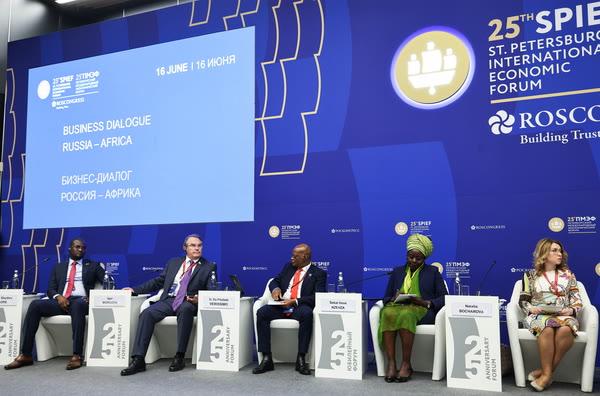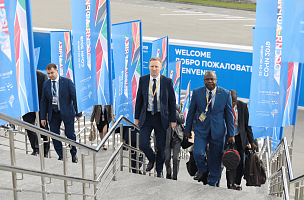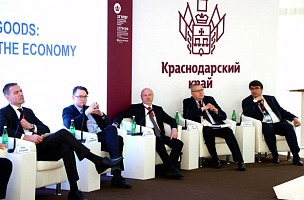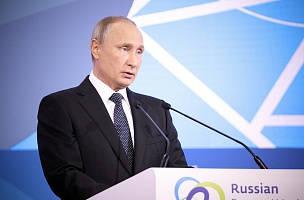Key conslusions
Russia and African countries are gradually strengthening cooperation and increasing trade volumes
“By the end of last year, we were not only able to halt the decline in trade caused by the pandemic, but also to return to our 2019 level of USD 17 billion. I am convinced that this is far from the limit. <…> Russia is successfully coping with the stressful situation [caused by] sporadic illegal unilateral sanctions imposed by the US and the EU, thanks to its responsible macroeconomic policy, the policy of our government. Today, they are taking systemic decisions to strengthen technological and economic sovereignty in the long term. In cooperation with international partners, we are taking steps to expand the use of national currencies and payment systems, we are working to consistently reduce the presence of dollar and the euro in mutual trade. In principle we stand for an independent and efficient financial system that is impervious to potential influence from unfriendly states. Bringing Russian and African economic operators to each other's markets is also at the top of the agenda, as well as encouraging their participation in large-scale infrastructure projects,” Alexander Pankin, Deputy Minister of Foreign Affairs of the Russian Federation.
“We view our cooperation with Africa as an important, promising and priority area of our work. <…> We do not just share great opportunities for cooperation, but problems that are pressing and that create intrinsic conditions for making this cooperation more meaningful and intensive, for making our economies closer,” Sergey Glazyev, Member of the Board, Minister in Charge of Integration and Macroeconomics, Eurasian Economic Commission.
“We do believe that Egypt is Russia’s gateway to the African market. We need more economic and trade ties, because Egypt plays an important role in Africa and its economic growth. Investment in Africa grew 147% in 2021 year-over-year… and reached USD 97 bln, while in 2020 it was only [USD] 30 bln,” Nevine Gamea, Minister of Trade and Industry of the Arab Republic of Egypt.
PROBLEMS
International projects and relations do not always factor African countries’ development level and existing problems
“We are talking about energy transition – what are going to do? We have not seen full-scale development yet, while today’s talk is about transition. We find ourselves in this situation when people do not necessarily think about our countries’ population. <…> As you know, our countries are very different. There are poorer countries, like the Central African Republic. There are countries in the state of conflict. We need a new train of thought that would not leave a single country behind. We need to factor it to move forward. Besides, we need to develop our sustainability,” Felix Moloua, Prime Minister of the Central African Republic.
“Eleven countries of Central Africa are members of our organization. Ties between Russia and this part of the African continent are not new, as many of these countries got their political independence with Russia’s support. Today, the very same countries need Russia to support their economic independence,” Gilberto Da Piedade Verissimo, President, Commission of the Economic Community of Central African States (ECCAS).
SOLUTIONS
Discussions to develop mutually beneficially cooperation between Russia and African countries. New mechanisms to support and strengthen interregional cooperation
“We are trying to develop mutually beneficial cooperation in our dialogue with Russia. We need to take a deep thought about potential mechanisms that could help achieve development goals and change in reality. When people talk about creating a free trade zone in Africa, they need to mention a different level of infrastructure. It needs to be addressed. <…> This is why I believe – I may not be always right – we need this talk; we need our people to see the real change. We are the continent that can be potentially very rich, but we are actually only rich in war and conflict. We have weapons, but we do not have the plants that make these weapons. Yet, the weapons keep coming. This is the question we are raising today. We need to take a look at those problems from a different perspective and to hold discussions that can really ensure change in our continent,” Felix Moloua, Prime Minister of the Central African Republic.
“Payment in national currencies is an important topic. The main issue here is problems in trade flow. Russia’s export to African countries significantly exceeds import. However, now when many of our Western partners have left the Russian market, I think new opportunities open up for our African partners,” Irina Abramova, Director, Institute for African Studies of the Russian Academy of Sciences.
“We need new improved government support measures. First of all, we need an investment fund or a direct investment fund for Africa. This is the way all the major players work in Africa. We need a bank that would finance small and medium businesses from African regions with start-ups. This is extremely important. Why? Because regional banks are not capable of doing this. Our businesses that are ready to go for Africa experience a huge debt load. What is even more important, the Russian Export Center needs to have an opportunity to finance regional exhibitions. It is absolutely clear, because on average every Russian region has 30–100 businesses that are ready for this type of activity, but we need to finance exhibitions,” Igor Morozov, Member of the Committee for Economy Policy of the Federation Council of the Russian Federation.
“We need to create a stock space and a stock market for the goods. It goes without saying that we need a new payment unit, which may keep our trade and economic relations safe from unilateral actions taken by the states that have monopolized the right for reserve currencies. By the way, it is unnecessary to make up and create new structures. There is such an instrument as special borrowing rights of the International Monetary Fund. <…> After the crisis of 2008–2009, China suggested using the IMF basket instead of dollar – a basket of special borrowing rights as a more stable and protected payment unit. <…> I believe that it could be the first step, and then we can think of ways to adjust this basket. Among other things, it may include currencies of developing markets and commodities. Then African countries could take part in shaping this basket,” Alexander Shokhin, President, Russian Union of Industrialists and Entrepreneurs.
New regulations to remove trade barriers
“The Federation Council is ready to support all initiatives [to change the legislation and remove the existing trade barriers, – Ed.] for those who already have an understanding what export to Africa means,” Igor Morozov, Member of the Committee for Economy Policy of the Federation Council of the Russian Federation.
“As you said earlier, the new investment code [of Algeria, – Ed.] is different. This code was adopted at the instruction of the president and provides for more preferences. <…> The new code that needs to be ratified by the parliament, is meant to ensure more freedoms in terms of both domestic and foreign investments,” Ahmed Zaghdar, Minister of Industry of the People’s Democratic Republic of Algeria.
Future educational programmes for African students need to create a conglomerate for business, science and education
“We propose educational programmes in English and French. This year, we have presented two more courses: an advanced training course for African alumni of Russian universities (this course launches this year) and a course on physics, mathematics, and IT technologies for high-school students, university students and teachers. It will start this year through our country’s budget. <…> It is important that the university does not just educate, but gives the education and teaches the technologies that are being introduced or will be introduced in African countries. In this case, it will result in a good conglomerate of business, science, our research and educational organizations,” Natalia Bocharova, Deputy Minister of Education and Science of the Russian Federation.
For more information, visit the Roscongress Foundation’s Information and Analytical System at roscongress.org.






